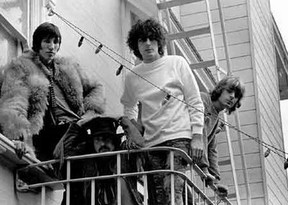 "Perhaps we were trying to show what Syd was really like," David Gilmour confessed, years later, "but perhaps we were trying to punish him." (T Willis, Madcap, p112).
"Perhaps we were trying to show what Syd was really like," David Gilmour confessed, years later, "but perhaps we were trying to punish him." (T Willis, Madcap, p112).
Elsewhere, he was equally candid. "We wanted to inject some honesty into it to try and explain what was going on. We didn't want to appear cruel, but there is one bit I wish I hadn't done in retrospect." (M Watkinson & P Anderson, Crazy Diamond, p92).
So what did they do that was so bad? It was in the mix and, perhaps, the handling of Syd himself. Malcolm and Syd had been aiming for a nicely polished album, beautifully produced and professional.
Roger and David went for something that showed Syd to be occasionally lost and rambling. There were ample opportunities for this. It's a rare artist or band which is pitch perfect and brilliant in one take. What they left in were the false starts and wrong keys.
'When I first heard the false starts to 'If It's In You' my reaction then, (as now) was first one of anger that they were left in, and, secondly, boredom! ... (my original mixes) would have been more of a candid insight to the atmosphere in the sessions and less detrimental to Syd's abilities than the ones left in. Those left in show Syd, at best, out of tune (which he rarely was) and, at worst, as out of control (which again, he never was).'
Malcolm Jones, The Making of The Madcap Laughs.
Once the album was released, there was also damage limitation on the part of Pink Floyd in the press. Roger Waters made an abortive attempt to claim that every song on The Madcap Laughs had been written years earlier, while Syd was still a productive member of his band.
This was quickly refuted by people like The Soft Machine and Malcolm Jones, who had witnessed Syd writing some of them actually in the studio. The assertion was then quietly dropped.
With the press heralding the album as a ghoulish insight into the tattered mind of Syd Barrett, sound-bites were carefully dropped into the melee in support of this. David Gilmour, at the time, described the recording sessions as 'nightmarish' and 'hell', implying that it was only the steady influence of himself and Roger which had allowed the public to have any album to buy.
This was reinforced by the very title of the release, which was chosen by David Gilmour. The Madcap Laughs came from a lyric in the song Octopus: 'The madcap laughed at the man on the border.'
But it also emphasized again the notion of Syd being impulsive and reckless. Before any member of the public had heard a note, they were being conditioned to consider the artist as not quite right.
Finally, in 1976, came the lie which many people, including Syd Barrett fans, believe to this day. I've already alluded to it in the previous section. That E.M.I. were ready to kick Syd out of their studio and only the intervention of Pink Floyd saved the album.
This simply isn't true. Malcolm Jones was an E.M.I. executive, as the record company had bought his Harvest Records (onto which Pink Floyd themselves were ultimately to move). He has categorically stated that E.M.I. were happy for Syd to take his time. They just wanted the album.
The only reason for the delays was that Pink Floyd were touring and recording their own music, thus Syd had to fit around their schedule. There was finally only a day and a half window in which Roger and David were free to help him. Even then they had to rush off to perform in a gig halfway through.
They, more than anyone else, knew how flustered Syd became by being rushed. They put him in a pressurized environment, littered with reminders that he wasn't in Pink Floyd anymore, then recorded the result in what should have been out-takes. Those snippets then got released on the album.
Finally, an 'oversight' saw the wonderful Opel get removed from the play-list. This could have been the single.
Did Pink Floyd attempt to nerf Syd's solo career during The Madcap Laughs? Yes, of course they did, but it back-fired. By now no-one wanted to hear professional Syd. They wanted the sensationalism of his breakdown and drug abuse. In many ways, Madcap gave them exactly what they wished to hear; and it catapulted Syd from darling of the press to absolute rock legend.
People always root for the underdog after all.






 Two things should be stated before anything else is said.
Two things should be stated before anything else is said.


 "Perhaps we were trying to show what Syd was really like," David Gilmour confessed, years later, "but perhaps we were trying to punish him." (T Willis, Madcap, p112).
"Perhaps we were trying to show what Syd was really like," David Gilmour confessed, years later, "but perhaps we were trying to punish him." (T Willis, Madcap, p112).





 St Tydecho's Churches in West Waleson 09/03/2014
St Tydecho's Churches in West Waleson 09/03/2014
 Goodies for an Outlander Premiere Partyon 03/06/2015
Goodies for an Outlander Premiere Partyon 03/06/2015
 Holocaust Memorial Day Interview with Rainer Höss, Grandson of Rudolf Architect of Auschwitzon 01/24/2015
Holocaust Memorial Day Interview with Rainer Höss, Grandson of Rudolf Architect of Auschwitzon 01/24/2015
 Romantic Valentine Gifts for an Outlander Fanon 01/16/2015
Romantic Valentine Gifts for an Outlander Fanon 01/16/2015




Comments
Here is the link to that Spotify playlist: https://open.spotify.com/user/1211622...
My group, the Laughing Madcap, had a marathon discussion about this very topic last spring. As a result, I created an alternative Madcap Laughs on Spotify that removes the hurried Gilmour-Waters tracks and replaces them with Jenner-Jones tracks already finished and waiting to be added to the mix. The first 13 tracks are the LP proper and the next 3 are "extra" tracks anticipating the CD reissue.
Certainly eye-opening, isn't it? I've had suspicions of Waters' trying to shipwreck Syd before with his claims of "schizophrenia".
I have come to the same conclusion as the article from piecing together interviews and information I got from various sources.
Thank you though for helping inform people about the true circumstances,
We will likely never know the truth, i.e., Roger and David's true intentions. At that time, The Floyd were reasonably still successful in England and parts of Europe (a number one UK LP in Atom Heart Mother was just around the bend) but had Syd released a monster LP he could have surpassed the band's success leaving them completely marginalised. I'm sure they were thinking of this...especially the highly competitive and ambitious Waters. Remember, it was Syd who wrote their previous hits...even if his last few attempts weren't successful.
There were also those rumours of Syd shouting from the windows of 6 St. Margaret's Square about killing Roger Waters... More than a few...leading me to believe that there's something to this...something to his anger toward only Waters.
By the way, EMI didn't buy Harvest Records from Jones...they started the label for him to run.
Yes, me too. And I'm now wondering if it was Malcolm Jones who tipped Syd off about Shine on You Crazy Diamond, so he could show up at the studio and freak them out.
I'm still working on this story and I'm sure now that David Gilmour genuinely did regret all of this. Roger apparently never did.
Did you know that when Roger appeared backstage at an R.E.M. gig, Michael Stipe was rude to him? Then Michael went on stage and did 'Dark Globe'. Roger was apparently amused. Strange reaction given what the song was about.
I have a feeling the bands continued tributes to Syd were about earning vicarious 'cool points' with the hip, authentic kids.